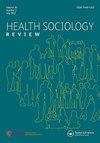老年痴呆症患者癌症治疗决策:自主、资本和权力的交叉点
IF 2.5
2区 医学
Q2 HEALTH POLICY & SERVICES
引用次数: 13
摘要
摘要在医疗保健中,健康风险评估受到身体和疾病的技术“客观”测量的影响;作为职业实践基础的价值观(如行善、不作恶和自主);医疗保健专业人员工作的组织;以及个人医疗保健专业人员的主观信念体系。因此,为老年人开的癌症治疗可能会因患者年龄的个人观点以及其他与年龄相关的健康状况或他们可能患有的合并症而有所缓和。根据对一家大型癌症服务机构九名关键工作人员的采访,我们研究了当患有癌症的老年人也患有痴呆症时,如何确定治疗建议和决定;两种在老年人中更常见的健康状况。我们的分析揭示了治疗决策中风险收益评估复杂过程的两个主题:卫生工作者之间资本和权力的不平等分配;以及患有癌症和痴呆症的老年人是否被单独评估为个体或嵌入支持性社交网络(个体自主与关系自主)。这项分析揭示了资本和个人对患有癌症和痴呆症的老年人的健康风险评估中隐含的痴呆症的信念,再加上组织限制,这对如何达成治疗建议和决策产生了重大影响。本文章由计算机程序翻译,如有差异,请以英文原文为准。
Cancer treatment decision-making with/ for older adults with dementia: the intersections of autonomy, capital, and power
ABSTRACT In healthcare, health risk assessments are influenced by technical ‘objective’ measurements of the physical body and disease; the values that underlie professional practices (such as beneficence, non-maleficence, and autonomy); the organisations healthcare professionals work for; and subjective belief systems of individual healthcare professionals. As a result, cancer treatments prescribed for older adults can be tempered by personal views about a patient’s age, and other age-associated health conditions or comorbidities that they may have. Drawing from interviews undertaken with nine key staff members in a large cancer service, we examine how treatment recommendations and decisions are determined when older adults with cancer also have dementia; two health conditions more common in older age. Our analysis reveals two themes that underlie the complicated processes of risk-benefit assessment in treatment decision-making: the unequal distribution of capital and power between health workers; and whether older adults with cancer and dementia are assessed as solely individuals or embedded in supportive social networks (individual versus relational autonomy). This analysis exposes capital and personal beliefs about dementia are implicit in health risk assessments for older adults who have cancer and dementia which, in conjunction with organisational constraints, significantly influence how treatment recommendations and decisions are reached.
求助全文
通过发布文献求助,成功后即可免费获取论文全文。
去求助
来源期刊

Health Sociology Review
Multiple-
CiteScore
7.50
自引率
0.00%
发文量
14
期刊介绍:
An international, scholarly peer-reviewed journal, Health Sociology Review explores the contribution of sociology and sociological research methods to understanding health and illness; to health policy, promotion and practice; and to equity, social justice, social policy and social work. Health Sociology Review is published in association with The Australian Sociological Association (TASA) under the editorship of Eileen Willis. Health Sociology Review publishes original theoretical and research articles, literature reviews, special issues, symposia, commentaries and book reviews.
 求助内容:
求助内容: 应助结果提醒方式:
应助结果提醒方式:


